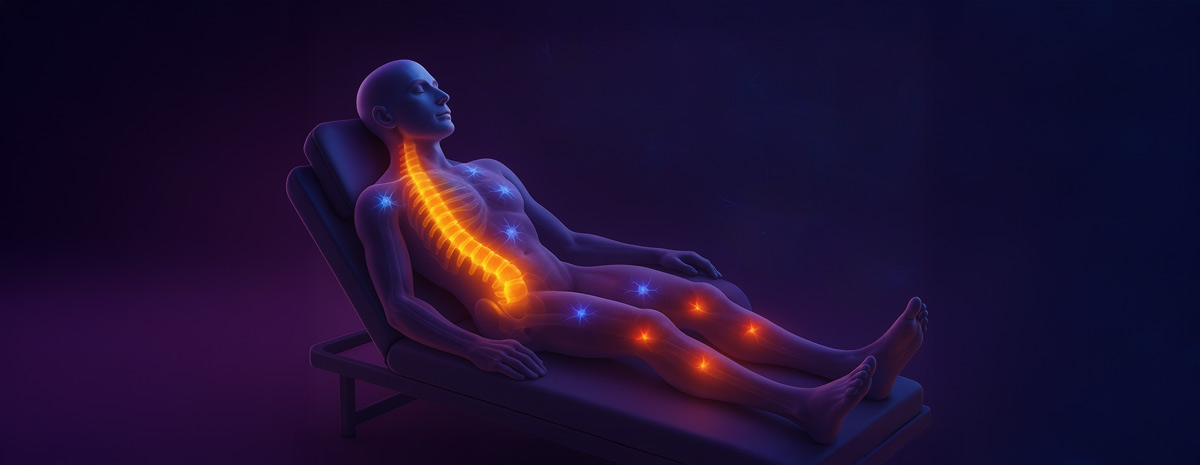
Get Centered Microdose: Enhance Awareness and Mental Clarity

Find the Center of the Head
This is where your journey begins - learning to locate and focus on the “mind’s eye,” the center of your head. Known as the seat of metacognitive awareness, this internal vantage point allows you to view your thoughts with neutrality and clarity. As you practice this visualization, you'll learn to detach from distractions, reconnect with your breath, and create spaciousness in your inner world. With time, this centering practice becomes a tool you can return to throughout your day to feel grounded and empowered - no matter what life throws your way.
The Benefits of the Get Centered Microdose
The Get Centered Microdose offers more than just a moment of calm, it lays the groundwork for a lasting shift in how you engage with your thoughts, emotions, and environment. Designed to help you rise above the noise and reconnect with your core, this practice strengthens your metacognitive awareness and promotes deep inner alignment.
Mental Clarity: Access a neutral space within your mind where thoughts can flow without attachment, reducing cognitive clutter and enhancing mental clarity.
Emotional Regulation: Develop the ability to observe your emotions without being overwhelmed, leading to greater emotional resilience.
Mindful Presence: Strengthen your ability to stay anchored in the present, a key factor in reducing anxiety and increasing mindfulness.
Self-Empowerment: Learn to guide yourself through life’s ups and downs with a deep sense of calm and self-trust.

The Metacognitive Strategy Behind Get Centered
At its core, Get Centered introduces the powerful technique of mind’s eye visualization. This Mindset Microdose encourages you to connect with a space of calm and neutrality, providing distance from daily distractions and a clear lens through which to observe your thoughts. By setting this foundation, you’re not only learning a technique but also cultivating a mindset that supports sustained mindfulness and well-being.
Tools & Techniques: The Mind’s Eye, Grounding, and Boundaries
In this Microdose, you’ll explore key techniques that lay the groundwork for self-awareness and mental centering.
Purpose: The mind’s eye serves as your center of clarity, a place where thoughts can flow without attachment. This can foster a calm vantage point where you can rise above your thoughts and visualize your life more clearly.
Technique: Direct your focus to the space between your eyes, creating a detached awareness. This practice helps you rise above mental noise and gain a broader perspective.
Purpose: Grounding connects you with the earth’s stabilizing energy, anchoring you in the present moment and promoting inner calm.T
Technique: Visualize a grounding cord from the base of your spine extending to the planet’s center. Set this cord to release anything that doesn’t serve your well-being.
Purpose: This boundary offers a protected space to process thoughts without external influence, enhancing mental clarity.
Technique: Imagine a protective bubble around you, about two feet away, creating a safe space that keeps distractions at bay and allows you to focus on your internal experience.

Daily Practice of Centering Techniques
Incorporate these simple yet powerful practices into your day to deepen your connection to the present moment and strengthen your centering skills.

Art Inspiration
Visualize your inner clarity through creative expression.
How to Do It: Grab a pen, crayon, or paintbrush... and create your own vision of the mind’s eye.
Benefits: Artistic expression is a powerful metacognitive tool that allows you to externalize and reflect on your internal experience. Drawing your mind’s eye helps you embody the clarity it represents. Use floating bubbles in your artwork to represent passing thoughts—watch them drift away as your sense of stillness deepens.
Research: Studies show that engaging in visual art can activate reward pathways in the brain and reduce cortisol levels, supporting stress relief and improved mood.

Nature Connection
Let the natural world reflect the calm within you.
How to Do It: Go on a mindful walk and pay attention to the stillness within movement.
Benefits: Nature offers a mirror to your internal state—moving yet still, dynamic yet peaceful. Observing it with intention helps you tap into your own inner calm and reinforces the power of your mind’s eye to remain centered amidst external activity.
Research: Time spent in nature has been linked to lowered blood pressure, reduced cortisol, and improved cognitive performance, including attention and working memory.

Mindful Diaphragmatic Breathing (Belly Breathing)
Anchor your awareness through the rhythm of your breath.
How to Do It: Place a hand on your abdomen. Inhale slowly through your nose so your belly expands. Exhale through pursed lips, keeping your chest relaxed.
Benefits: This type of breathing improves oxygen flow and activates the parasympathetic nervous system, promoting a relaxed and focused state. It also engages your core for better postural stability.
Research: Diaphragmatic breathing has been shown to reduce anxiety, lower heart rate, and improve heart rate variability—key indicators of a calm and balanced nervous system.
Centering Affirmations for Present Moment Awareness
Affirmations are powerful mindset tools that can help you focus and align with positive intentions. To get the most out of these affirmations, try saying them to yourself three times a day in the mirror. Take a deep breath, repeat each phrase slowly, and allow the message to resonate, as you rewire your metacognition.
“This is MY mind. I own it. I am responsible for it. I can train it to support me.”
“At this moment, I am free to choose clarity and focus.”
“I return to the center of my mind, where stillness and strength begin.”
“I am centered, grounded, and connected to my inner calm.”

Expand Your Metacognitive Abilities: Microdoses to Explore Next
After Getting Centered, continue your mindset development with these relevant Microdoses to expand your metacognitive skills.
Macrodoses to Pair with Get Centered
Deep Guided Visualization Sessions
FAQs About Get Centered
Get clarity on how to use this Microdose, integrate it into your routine, and make the most of your centering practice.
The mind’s eye is a cognitive space located at the center of your head, behind the eyes. Focusing here promotes mental clarity by helping you detach from racing thoughts and observe from a calm vantage point.
Grounding helps stabilize your awareness, anchoring you in the present moment. This practice can reduce stress and improve focus, making it easier to approach challenges with a calm mindset.
Use the grounding technique or mind’s eye visualization anytime you feel overwhelmed or distracted. Practicing these regularly strengthens your ability to return to center quickly and effectively.
Setting a boundary creates a safe mental space, allowing you to process your thoughts and emotions without external interference. It’s a valuable tool for maintaining emotional balance and reducing stress.
Create a quiet, comfortable space, use headphones for an immersive experience, and approach the session with an open mindset. Practicing regularly will deepen the effects over time.
Learn About Limitless App

Before Ketamine Therapy: Preparing for Your First Appointment

What If “Nothing Happened” During My Ketamine Therapy Session?

How Long Does Ketamine Pain Relief Last?

Why Does My Pain Linger? Understanding Central Sensitization

5 Key Techniques to Rewire Your Brain with Intention





